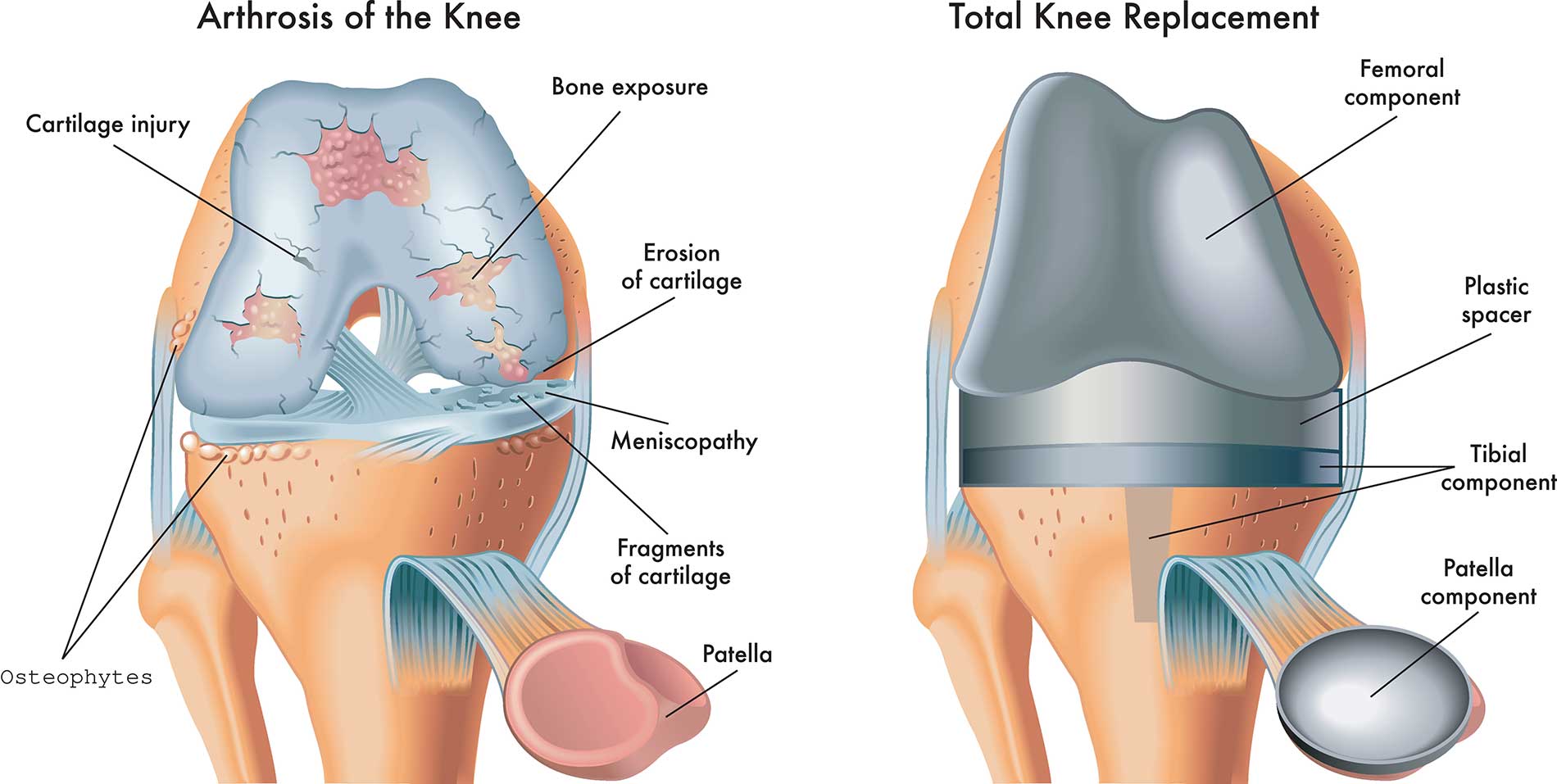Knee replacement surgery, also known as knee arthroplasty, is a common procedure designed to alleviate pain and restore function in severely diseased knee joints. This surgical intervention is particularly significant for individuals suffering from chronic knee pain due to arthritis or injury, which hinders their daily activities and overall quality of life. Suitable candidates for knee replacement surgery often include the elderly, patients with advanced osteoarthritis, rheumatoid arthritis, or post-traumatic arthritis, and those for whom conservative treatments like medications and physical therapy have failed. This blog aims to provide a comprehensive guide on knee replacement surgery, covering everything from pre-surgery preparation to life after the procedure.
Preparing for Surgery
Before undergoing knee replacement surgery, a thorough evaluation by an orthopedic surgeon is essential. This process typically involves:
- Medical History Review: The surgeon will review your medical history, focusing on knee-related issues, previous treatments, and overall health.
- Physical Examination: A detailed examination of your knee’s range of motion, stability, and strength.
- Imaging Tests: X-rays, MRIs, or CT scans to assess the extent of joint damage and plan the surgery.
- Blood Tests and Health Assessments: To ensure you are fit for surgery, your doctor may recommend blood tests, ECGs, and other assessments.
Physical Preparations
- Once cleared for surgery, physical preparations play a crucial role in ensuring a smooth procedure and recovery.
- Strengthening Exercises: Engage in exercises to strengthen the muscles around the knee, improving post-surgery recovery.
- Weight Management: Maintaining a healthy weight can reduce stress on the knee joint and enhance recovery.
- Prehabilitation: Working with a physical therapist before surgery to learn exercises and stretches that will aid post-operative recovery.
The Surgery Day
On the day of surgery, you’ll follow several steps from admission to the operating room:
- Check-In: Arrive at the hospital or surgical center at the designated time for check-in procedures.
- Pre-Operative Preparation: Change into surgical attire, and undergo final checks, including vital signs monitoring and IV-line insertion.
- Meeting the Surgical Team: You’ll meet the anesthesiologist, who will discuss anesthesia options, and the surgical team will review the procedure with you.
The Operating Room Experience
- Anesthesia Administration: You’ll receive either general anesthesia (you’ll be asleep) or regional anesthesia (you’ll be awake but numb from the waist down).
- The Procedure: The surgeon will make an incision, remove damaged cartilage and bone, and replace it with artificial components made of metal and plastic.
- Closing the Incision: The incision will be closed with stitches or staples, and you’ll be moved to the recovery area.
Post-Surgery Recovery
Pain management is crucial for a smooth recovery:
- Medications: Your doctor will prescribe painkillers and anti-inflammatory medications.
- Ice and Elevation: Regularly applying ice packs and elevating your leg can reduce swelling and pain.
- Physical Therapy: Begin physical therapy as soon as possible to regain strength and mobility.
Rehabilitation Exercises
Engage in specific exercises designed to improve knee function:
- Range of Motion Exercises: To prevent stiffness and maintain flexibility.
- Strengthening Exercises: Focused on the quadriceps, hamstrings, and calf muscles.
- Balance and Stability Exercises: To improve overall knee stability and prevent falls.
Home Care
Proper home care is vital for a successful recovery:
- Wound Care: Follow your doctor’s instructions for keeping the incision clean and dry.
- Mobility Aids: Use crutches, walkers, or canes as recommended to support your mobility.
- Follow-Up Appointments: Attend all scheduled follow-ups to monitor your progress and address any concerns.
Life After Knee Replacement
Knee replacement surgery can significantly improve your quality of life:
- Pain Relief: Most patients experience substantial pain relief.
- Improved Mobility: Enhanced knee function allows for greater participation in daily activities and low-impact sports.
- Longevity of Implants: Modern knee implants can last 15-20 years or more with proper care.
Knee replacement surgery offers a viable solution for those suffering from chronic knee pain and limited mobility. By understanding the procedure, preparing adequately, and following post-operative care guidelines, patients can look forward to a significant improvement in their quality of life. If knee pain is holding you or your loved ones back, consider knee replacement surgery as a path to renewed mobility and a more active lifestyle.
Home Healthcare Supplies in Vernon and Salmon Arm BC
At Lakeside Medical Supplies, we want to make home health care as easy as possible by providing the medical supplies you need at competitive prices. We carry a large inventory of mobility aids to assist you with postoperative care. We have two accessible locations in Vernon (250) 542-2425 and Salmon Arm (250) 832-2431 and offer free delivery to your door for orders over $100.
Visit Us on Facebook


